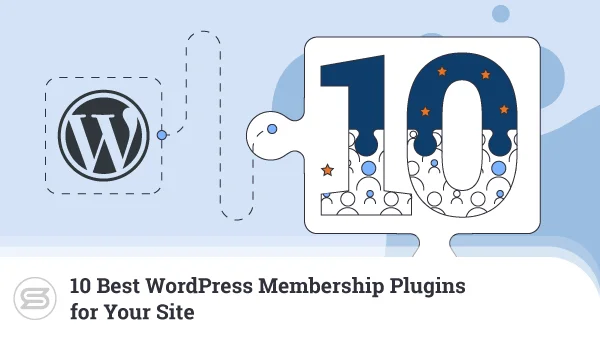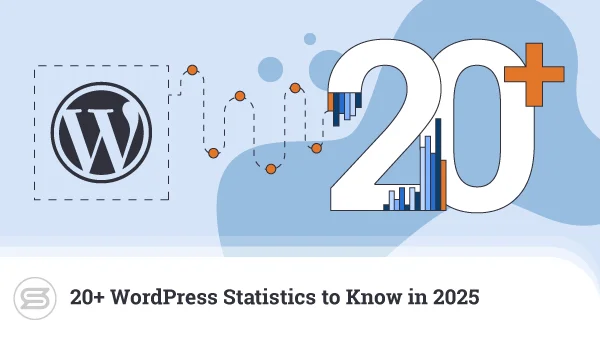WordPress may seem similar to most website builders in many ways. All make use of а Graphical User Interface (GUI) that improves the user experience. In addition, they can be utilized without previous coding experience. Still, what makes one better than the other? Today, we are putting WordPress vs Website Builders to the test to see which is the best solution for building a website.
What is WordPress and How Does it Work
WordPress is a Content Management System (CMS), a software used for creating and managing websites. It was primarily designed to help users build content-centric websites. This isn’t restricted only to text but includes all kinds of dynamic elements like images and even video.
WordPress is an open-source system that utilizes PHP and the MySQL database model. Whenever a visitor query arrives, WP extracts the necessary information from the database and formats it before delivering the content.
WordPress is free to use and its architecture allows anyone to pitch in and help with plugin and theme development. This allows the platform to build all kinds of websites – blogs, business websites, online shops, community forums, portfolios, the works.
Pros and Cons of WordPress
There are many other CMS solutions available on the market, such as Joomla and Drupal. WordPress, however, is by far the most popular and versatile option. Because of its massive user community, WP has a very robust and healthy ecosystem.
The options for WordPress plugins and themes are practically limitless, with more helpful tools coming out every month. They help improve your site performance, secure your pages, and extend their functionality.
Still, you need to have your own web hosting account to install and manage WordPress. That is one big difference the CMS has with many modern website builders.
What is a Website Builder and How Does it Work
Website builders are meant to help users quickly build and deploy sites. They are mainly considered complementary tools and play a minimal role in the actual site operation. Basically, once the website builder has completed its job, your website should be able to run on its own.
Because the goal here is quick publishing, website builders often make use of drag-and-drop functionalities. This makes the daunting task very easy for beginners and startups looking to get online with zero effort.
Pros and Cons of Website Builders
Most website builders are proprietary tools and the developer companies often pair them up with web hosting to sell it as an all-encompassing subscription service.
Then we have the ease of use, probably the most essential selling point of site building tools. You don’t need any previous experience or coding knowledge – the website builder allows you to fill in content and rearrange site elements effortlessly.
While this makes it easy for novice users, site-building tools often lack advanced options or come with heavy restrictions. For example, some platforms don’t allow website changes once the page is published. Others will restrict you from exporting your content and using it elsewhere.
Taking the right pick requires some careful planning.
Which to Choose for Your Website
Generally, WordPress is better for content-heavy websites and pages that expect active growth.
Website builders, on the other hand, offer beginners an easier introduction to the world of website building.
Ultimately you will need to decide which to use based on a few characteristics.
Ease of use
Website builders have a softer learning curve compared to WordPress. Although both offer a GUI, they are designed to serve different purposes. Both platforms are suitable for beginners, but once you get used to WordPress, you can do heaps more with the CMS than with a site-building tool.
Features
With WordPress, the sky is the limit, since advanced features can be easily expanded with the use of free and paid plugins.
This is rarely the case with website builders. Even excellent builder providers don’t have the capacity for expansion when compared to WordPress. Their focus is on ease of use, which means all options have to be essential and straightforward.
Editing
Unless it’s using specific plugins, WordPress is slightly lagging in the content editing department. WP utilizes the WYSIWYG editor, which is very straightforward and easy for beginners.
Still, when it comes to the website builder editors, they are generally more convenient, offering features like drag-and-drop editing. The system is very intuitive and beginners pick it up fairly quickly.
Flexibility
WordPress is by far the more powerful and versatile option here. Thanks to its plugin system and open-source nature, the add-on features are virtually limitless. You can use it to build any type of site you like, from a static page to a large online store with thousands of products. This high degree of modularity is a big reason for the popularity of the CMS.
Security
Since WordPress is often user-operated and maintained there is a chance that vulnerabilities appear if your hosting account is not properly secured or the WordPress core and plugins are not updated. Not to mention that, due to its popularity, the CMS is a favorite target for hackers.
As for website builders, the responsibility of security typically falls on the service provider instead of the user. The developers are well-aware of the needs of their platform, so there is minimal room for errors.
Hosting
Since WordPress can run on any Linux web host, that leaves you with a lot of choices for a provider. Of course, not all hosting providers handle the app with equal efficiency. Some web hosts have recognized the importance of WP in modern site building and have configured special packages that cater to the needs of WordPress users alone.
Support
Both WordPress and website builder users generally have access to support from the host. WordPress has a very strong community while the latter has official support channels from the service provider.
It really is a matter of hosting provider vs site builder developers.
Price
WordPress is free and users only need to pay for hosting if they decide to use the popular CMS.
On the other hand, website builders are generally premium tools that come at a higher rate. This is because the package not only includes the platform, but also encompasses the maintenance, updates, and technical support from the provider.
ScalaHosting for WordPress
ScalaHosting has an excellent range of WordPress hosting plans.
Smaller, less intensive sites can easily be supported on our shared hosting plans. If you intend to host a growing project, you may want to consider a Managed Cloud VPS plan instead.
Opting for a virtual server, you will have access to the SWordPress Manager – a one-stop utility that helps you with WP installation, updates, and security.


Conclusion
Unless you’re planning to build a very basic site and seldom update it, WordPress is generally a much better choice. While website builders are very convenient, they are quite limited in growth options and that’s your ultimate goal when getting online.
Frequently Asked Questions
Are website builders worth it?
Website builders generally charge higher rates than what you’d pay for WordPress hosting. Also, if you’re planning to grow your website, opting for an independent platform with a hosting provider is a much better choice.
Is WordPress Good for Websites?
WordPress is an excellent choice for websites. The CMS is flexible, relatively easy to use, and very powerful with the aid of its massive plugin ecosystem. It’s free licensing and compatibility with most hosting providers make it a dominant player in the CMS market.
Is WordPress still popular in 2020?
WordPress has been steadily growing in market share over the years and this hasn’t changed in 2020. The CMS has seen a further 2% growth, expanding its influence over a whopping 35% of all websites in the world.
What are the disadvantages of WordPress?
Since WordPress needs to work with a database, resource requirements are generally higher compared to static website builders. Also, while it may be easy to use, it can take some time to get used to if you are a beginner.



